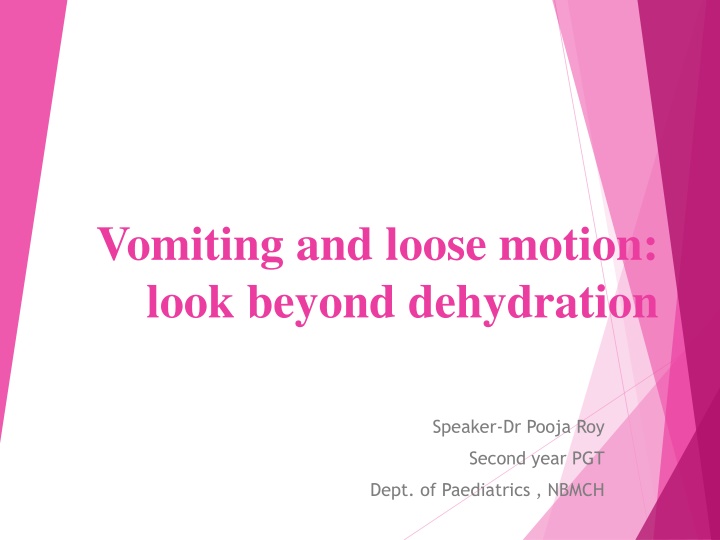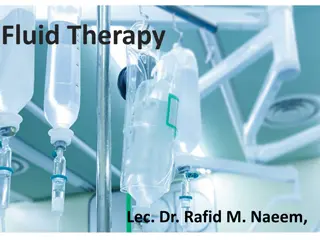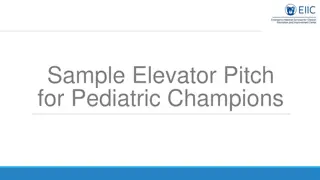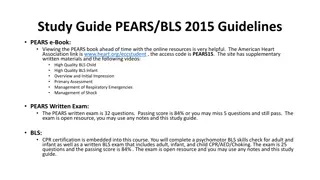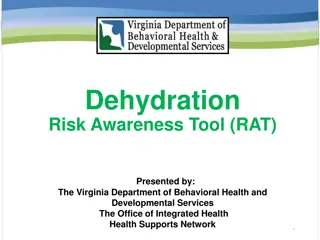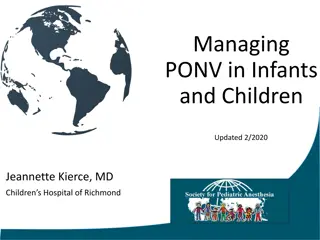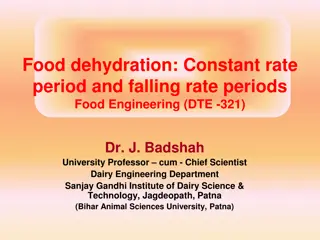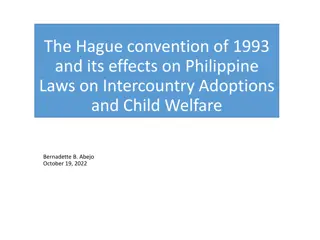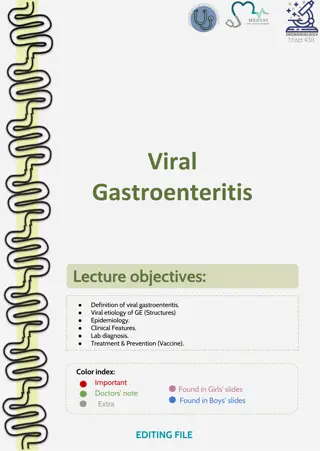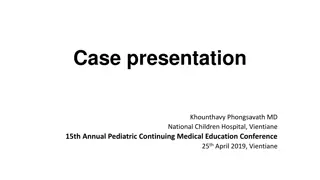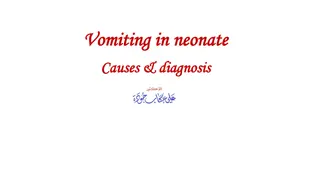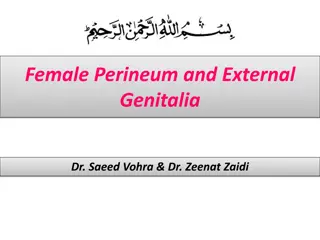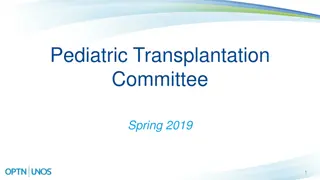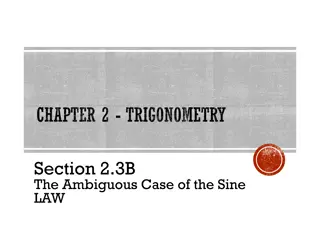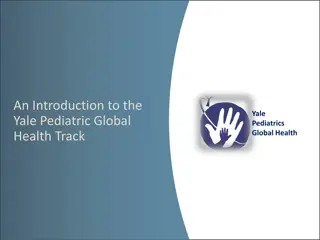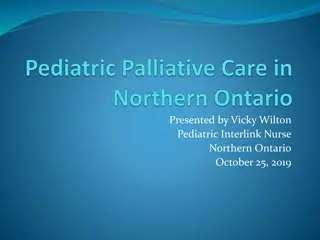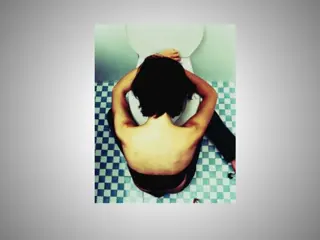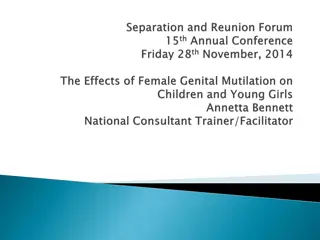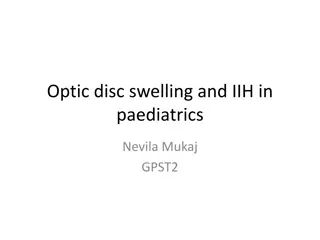Pediatric Case Study: Vomiting, Dehydration, and Ambiguous Genitalia in a 3-Year-Old Child
A 3-year-old child was admitted with severe dehydration due to persistent vomiting, alongside failure to thrive. Despite treatment, hypotension remained unresolved. Examination revealed ambiguous genitalia with clitoromegaly and absent gonads. Investigations showed electrolyte imbalances and hormonal abnormalities. Further management and evaluation are necessary for this complex pediatric case.
Download Presentation

Please find below an Image/Link to download the presentation.
The content on the website is provided AS IS for your information and personal use only. It may not be sold, licensed, or shared on other websites without obtaining consent from the author.If you encounter any issues during the download, it is possible that the publisher has removed the file from their server.
You are allowed to download the files provided on this website for personal or commercial use, subject to the condition that they are used lawfully. All files are the property of their respective owners.
The content on the website is provided AS IS for your information and personal use only. It may not be sold, licensed, or shared on other websites without obtaining consent from the author.
E N D
Presentation Transcript
Vomiting and loose motion: look beyond dehydration Speaker-Dr Pooja Roy Second year PGT Dept. of Paediatrics , NBMCH
Clinical manifestations A three years old child was admitted to paediatric ward with complaint of vomiting causing severe dehydration. She had multiple such episodes since birth. She also had features of failure to thrive.
History Informant: Child s parents . Age: Three yrs. Term /Born out of third degree consanguineous marriage. Normal vaginal delivery. Exclusively breastfed till 6 months of age. Had multiple episodes of vomiting since birth. Developmental milestones achieved till age. Immunization status complete till date. Belong to lower socioeconomic status according to modified Kuppuswamy scale.
General and systemic examination Alert /conscious/irritable. Anthropometry: Weight-10 kg Height-87 cm Mid upper arm circumference-10 cm Head circumference- 49cm Body surface area-0.487m2 BMI-13.21kg/m2
Sunken eyes. Decubitus of choice. Pallor /Clubbing/Jaundice/Cyanosis/edema- absent. B.P-90/50 mmHg Pulse 100/ min. CBG -80mg/dl. Respiratory rate-18/min. CVS-S1,S2 audible. B/l chest Air entry present . Abdomen- Soft , no organomegaly.
Genito urinary system: Genitalia was found to be somewhat ambiguous. On detailed examination following picture was found. Clitoromegaly present Urethral opening is present Prominent labio- scrotal fold without any palpable gonads
Summary A 3 yrs old child with complaint of repeated episodes of vomiting causing dehydration . Features of failure to thrive . Found to have ambiguous genitalia . Hypotension didn t get corrected even after treatment of dehydration.
Investigations CBC-WNL. CRP-Non reactive. Serum sodium 121meq/l. Serum potassium-5.2meq/l. USG pelvis- bilateral ovaries along with uterus present.
Androstenedione-7.67nmol/l.(normal -0.2 to 1.571 nmol/l) Cortisol-139nmol/l.(normal -68.75 to 632.5nmol/l) 17-OHP +Androstenedione :Cortisol ratio - 5.08(>3.75). 17 hydoxyprogesterone-699 nmol/l.(normal-0.09 to 2.71 nmol/l). Karyotyping- 46 XX.
MRI pelvis: Uterus and bilateral ovaries present. Kidney, urinary bladder and rectum normal. Both adrenal glands enlarged.
A 3 years old was admitted with severe dehydration due to multiple episodes of vomiting along with failure to thrive . Ambiguous genitalia . She was also hypotensive which didn t get corrected even after treating dehydration. The patient was hyponatremic and has uterus and bilateral ovaries on USG pelvis. Her serum 17 hydroxy progesterone, serum androstenedione, serum cortisol are elevated . Her karyotype is 46XX.
CONGENITAL ADRENAL HYPERPLASIA DUE TO 21ALPHA HYROXYLASE DEFICIENCY
Treatment Treatment of dehydration and failure to thrive. Tab hydrocortisone (5mg) : Two third tab after getting up from bed in the morning and one third tab at 4 pm. Tab Fludrocortisone ( 100microgram) one tab after getting up from bed . Regular follow up at paediatric opd . Surgical opinion for genito-urinary reconstruction of ambiguous genitalia.
The child is responding well to the treatment. She gained weight ,her dyselectrolemia got corrected and her vomiting is also under control.
Learning points Social stigma: -Even though it is not an uncommon condition, patient was diagnosed at a later stage causing irreparable trauma to child and her parents. -Diagnosing at an early life has better results in managing the condition. -We should make it a habit to look at genitalia , in case a child present with repeated episodes of vomiting.
